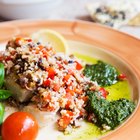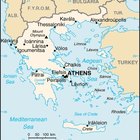
OlgaMiltsova/iStock/Getty Images
Fish and chips, pies, roast turkeys and potatoes may be what you think of as the typical English diet. In fact, the modern English diet has incorporated diverse culinary influences from around the world. Early Roman and Viking invaders brought new foods; the culinary riches of the British Empire were exploited; and today's immigrants have brought their own culinary traditions to the English diet. Chicken tikka masala is now as quintessentially English as fish and chips.
Roman and Viking Influences
From prehistoric times, people living in England ate the native animals, fish and plants which flourished in the English climate. Grains including oats and wheat were grown and baked into bread in Britain from as early as 3700 BC. Rabbit was a staple meat in the English diet from the early Roman period (43 to 410 AD) -- the Romans also introduced English dietary staples such as apples, celery, cucumber, onions, parsnip, pies and peas. Vikings introduced foods including smoked fish and rye bread into the English diet.
British Colonial Influences
As the British Empire expanded in all continents of the world, the English appetite for exotic foods also expanded. Britain's colonies in the Caribbean provided sugar, bananas and rum for English consumption, while coffee and tea were imported to England in clipper ships. Curries from India gained popularity in England from the mid-eighteenth century, with the first Indian restaurant opening in England in 1809.
Wartime and Post-War Diet
World War I (1914-1918) and World War II (1939-1945) changed the typical English diet. Britain imported much less food during both wars because of the danger of submarine attacks on merchant vessels. English people were encouraged to grow their own food in "victory gardens," and became increasingly thrifty with food. Apple crumble and carrot cake were made in wartime from available rations and home-grown produce, and remain popular in England today. Rationing continued in the post-war years -- people continued eat thriftily, as they had during the war. Bread and dripping, boiled pig's head, and other offal-based delights featured in the austere post-war English diet.
Contemporary English Diet
The contemporary English diet has assimilated influences from these historical periods. Vegetarianism in England has grown in popularity during the twentieth and twenty-first centuries. However, the English diet still focuses quite heavily on meats and root vegetables. Influences from other European countries and further afield have also been integrated -- the first Chinese restaurant in England opened during the 1930s. London, in particular, has restaurants offering a huge array of world cuisines. While the variety of foods available to English people is unprecedented, problems regarding access to food have arisen. Supermarkets have increasingly relocated outside of urban areas, leaving some city-dwellers in a so-called "food desert" where food choices are limited and often unhealthy.
Benefits
The traditional English diet places emphasis on meat and fish products, and therefore is high in protein. High consumption of dairy products provides English people with sufficient calcium for the maintenance of strong bones and teeth, and the prevention of osteoporosis. Influences in the English diet from Mediterranean Europe have led to a beneficial increase in consumption of unsaturated fats -- such as olive oil -- instead of saturated fats.
Side Effects
Traditional English dishes such as beef and lamb roasts, fish and chips, pies and gravies are high in saturated fat. The Vegetarian Society reports that roughly 42 percent of energy in the average English diet is derived from fat. The Committee on Medical Aspects of Food Policy recommends that fat should provide no more than 35 percent of dietary energy, while the National Advisory Committee on Nutritional Education recommends a maximum of 30 percent. The relatively high proportion of fat -- and particularly saturated fat -- in the English diet is believed to contribute to the relatively high incidence of heart disease in England. Britain as a whole has a higher rate of heart disease than 12 of the 15 other European Union countries.
Related Articles

The Mayan Diet

The History of Smoking Meat

Paleo-Mediterranean Diet

A List of Foods From the Medieval Times

Facts About Italian Cuisine

African Food Facts

Neolithic Diets

Appetizers in Elizabethan Times

Staple Foods in Greek Culture

Southeast Asian Diet & Nutrition

Traditional French Easter Food

Traditional Hawaiian Diet

What Foods Do People in Ireland Eat?

Bohemian Cooking

Ancient Indian Cooking Methods

Hopi Indian Foods

About Colonial Desserts

History of African Peanut Soup

What Is a Tiki Party?

Baking Vs. Roasting in Convection Ovens
References
Resources
Writer Bio
Jae Allen has been a writer since 1999, with articles published in "The Hub," "Innocent Words" and "Rhythm." She has worked as a medical writer, paralegal, veterinary assistant, stage manager, session musician, ghostwriter and university professor. Allen specializes in travel, health/fitness, animals and other topics.
Photo Credits
OlgaMiltsova/iStock/Getty Images